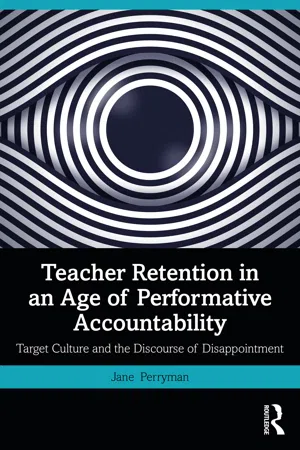
Teacher Retention in an Age of Performative Accountability
Target Culture and the Discourse of Disappointment
Jane Perryman
- 164 pages
- English
- ePUB (mobile friendly)
- Available on iOS & Android
Teacher Retention in an Age of Performative Accountability
Target Culture and the Discourse of Disappointment
Jane Perryman
About This Book
In this insightful and timely volume, Jane Perryman provides a definitive analysis of the crisis in teacher recruitment and retention through a critique of the culture of performative accountability in education, bringing together theory, literature, and empirical data.
Drawing on data across several long-term research projects and through a Foucauldian theoretical framework, Perryman argues that teachers' working lives, both in the UK and internationally, are being increasingly affected by the rise in the neoliberal performativity and accountability culture in schools. Teachers' work is increasingly directed towards assessment, exams, progress measures, and preparation for review and inspection, and drawn away from the more individualistic and creative aspects of the job. This culture of hyper accountability and super-performativity, Perryman argues, has created a 'discourse of disappointment' – where the hopes and aspirations of teachers are crushed beneath the performative pressures under which they work.
Teacher Retention in an Age of Performative Accountability offers a convincing, compellingly written critical analysis of how the values, purposes and practices embedded in education affect the working experience of teachers over time. Perryman makes a significant contribution to our understanding of the effects of accountability and performativity mechanisms in schools and offers insight into why so many teachers leave the profession. This analysis is important to scholars, educators, and policymakers alike.
Frequently asked questions
Information
1 The intensification of accountability
Introduction
Accountability and the neoliberal paradox
the accountability term remains ambiguous and multifaceted, with policy actors employing various and often implicit definitions of accountability, its elements and its limits. Overall, accountability is a concept with multiple meanings, and a policy programme that covers a broad range of policy options and models including political, legal, bureaucratic, or market forms of accountability.
while it can be argued that accountability was initially only a part of school systems, the neoliberal framing of accountability and the move to an audit culture has seen performative accountability transformed to become, arguably, the system itself
neoliberalism has come to represent a positive conception of the state’s role in creating the appropriate market by providing the conditions, laws and institutions necessary for its operation. Whereas in classical liberalism the individual is characterised as having an autonomous human nature and can practice freedom, in neoliberalism the state seeks to create an individual that is an enterprising and competitive entrepreneur(2015: 130)
Education systems were mandated to develop efficient, creative and problem-solving learners and workers for a globally-competitive economy, while teachers were to demonstrate that they had had taught their young charges through national (SATS) and global (e.g. PISA, TIMMS) systems which demonstrated ‘added value’(Robertson 2007: 11)
Neo-liberal governments, therefore, desire to reduce funding for education while at the same time reorganizing education to fit the needs of the economy. Because the public might object to cuts in social spending and increasing economic inequality, neo-liberal policy makers have skillfully packaged the reforms to make it appear that they are promoting equality
While carried out in various ways and to various degrees around the world, a heightened focus on student testing is nevertheless a global phenomenon, as major transnational agencies such as the OECD, the United Nations Educational, Scientific and Cultural Organization (UNESCO), and the World Bank have invigorated a global interest in school performance measures that rely on standardized tests to measure, evaluate, and compare national and subnational education systems
- Seven ‘diverse countries’ which have ‘comprehensive evaluation and accountability measures’, but less rigorous/formal external standards and control mechanisms.
- UK and USA – characterised by marketisation, decentralisation and an established tradition of standards, and control.
- ‘The continental welfare states’ plus Finland, Italy and Greece. These are characterised by their strength on internal evaluation but little else, though accountability measures continue to increase. For example, ‘in Austria, Switzerland and Germany, the publication of TIMSS 1997 and PISA 2000 results was followed by thorough educational reforms’ (ibid: 267).
- Spain, Ireland, Iceland and Luxembourg, where there is ‘stricter control in terms of external standards’.
internationally the most famous neoliberal educational reform framework…which obliged individual states in the United Sta...
Table of contents
- Cover Page
- Half Title Page
- Title Page
- Copyright Page
- Dedication
- Contents
- Acknowledgements
- Introduction
- 1 The intensification of accountability
- 2 Performativity, governmentality and the teacher self
- 3 Performative accountability: The case of inspection
- 4 The emotions of teaching
- 5 A crisis in retention
- 6 Conclusion: Time for a change?
- Index